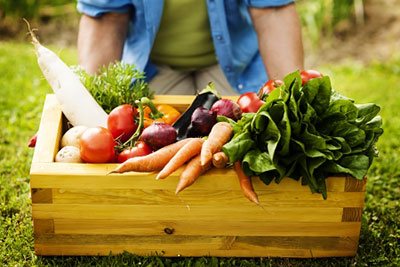The Wisdom Of Real Food
 My relationship with food evolved the day I decided to start my own garden. I didn’t have much space where I lived, so I rented a plot in a community garden nearby, for a very small fee.
My relationship with food evolved the day I decided to start my own garden. I didn’t have much space where I lived, so I rented a plot in a community garden nearby, for a very small fee.
Although it soon became a part-time job, it also turned into my sanctuary. Any stress from the day cleared when I went there. I was always eager to go there and visit my growing family of fruits, herbs, flowers and vegetables. It made me feel like a child again!
Connecting with the Earth on such a deep level also gave me a new perspective on my spiritual identity. From being inspired by fellow gardeners to teaching my son important life skills, I was motivated to get serious about treating my body like a temple and also raising awareness in others. Something I once took for granted and paid little attention to, became a great passion and concern for me.
This magical, marvelous food on our plate, this sustenance we absorb, has a story to tell. It has a journey. It leaves a footprint. It leaves a legacy. To eat with reckless abandon, without conscience, without knowledge; folks, this ain’t normal ~ Joel Salatin
I saw our society falling into a downward spiral health wise and knew it started with the quality of our food and water. I began to educate myself more on how everything we consume was being processed and came to the conclusion how vital it is for us to re-adopt some of the old traditions of our grandparents and ancestors. By taking their wisdom and applying it to our current food crisis, we can raise the consciousness of our world, feed the poor, and heal ourselves in mind, body and spirit.
Here are some key points to keep in mind the next time you go out to eat, or prepare a meal in your kitchen:
1. Check your food labels. If the list is long and half of it is preservatives or fillers, put it back on the shelf. The less processed it is, the better you will feel. Try to invest in non-GMO and organic options to ensure quality.
2. Visit farm markets or buy local. By supporting local farmers, you are not only helping the environment and supporting a small family business, but the nutrients are higher because it hasn’t traveled too far and has not been treated with extra chemicals to increase its shelf-life.
3. Start a garden. Select a spot in your yard, or rent a plot in a community garden, and make it happen step by step. The rewards and hard work you put forth will pay off in the future.
4. Plan meals in advance. Planning meals will save you from picking unhealthy options as a matter of urgency. By making a grocery list, you will save money and reduce stress trying to figure out what to eat in a hurry.
So, lets do this. Lets all stop wasting our money on mediocre food that someone else just put in the microwave then handed over to us. Make something delicious. Make something that fills you up. Make something that you are proud of ~ Beth M
5. Get into the kitchen. Overall, our world has looked for quick options to satisfy our hunger. Family meals too often come from a drive-through window or in a box – lacking in love and nutrients. Getting into the kitchen requires discipline and the desire to live a more wholesome lifestyle. If you need motivation, try cooking with a friend or family to make it special, or take a class with someone special.
6. Eat slow and be thankful. Even though you may have only 30 minutes or less to eat a meal, it doesn’t need to be a race. By properly chewing and savoring each bite, you will begin to feel more of a connection and a sense of gratitude for the food that nourishes you. It is the environments greatest gift to us!
|
|

Leave a Reply